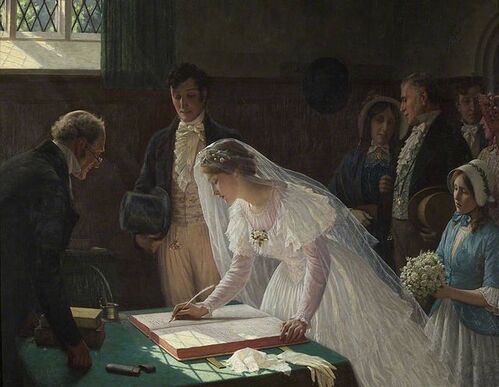January 8th, 2025
by Roger H
by Roger H
For better, for worse...

The Wedding Register, Edmund Leighton 1920
The Apostle Paul wrote:
"Love is patient, love is kind. It does not envy, it does not boast, it is not proud. It does not dishonour others, it is not self-seeking, it is not easily angered, it keeps no record of wrongs. Love does not delight in evil but rejoices with the truth. It always protects, always trusts, always hopes, always perseveres." - I Corinthians 13.4-7
True love is not just a feeling. It’s a deliberately made decision to practise with another person what Paul teaches here. It’s a commitment to stick with someone for life, whatever happens, working with who they are and not wishing they were someone different.
Marriage binds us to someone we truly love. It’s the recognition of a permanent life-long monogamous relationship between two people of the opposite sex. It’s this relationship that provides the ideal environment and stability to conceive and raise children.
Unlike a cohabitation arrangement, in a wedding the couple make a public vow to God and/or the state that whatever happens in life they will stay together.
In many Christian wedding services, the man says to the woman;
“I take you as my wife, to have and to hold from this day forward; for better, for worse, for richer, for poorer, in sickness and in health to love and to cherish till death us do part; according to God’s holy law. In the presence of God I make this vow.”
Some cohabiting couples also agree they will stick together through thick and thin. Others agree they will only stay together just as long as they are both happy. However, whatever they agree at the beginning can be more easily ignored by one partner than in a marriage.
Because of their sexual union, cohabiting couples form deep emotional bonds just like married couples. When they split, they experience the same psychological distress as a divorcing married couple.
But, it's more awkward and expensive to end a marriage than a cohabitation. This hurdle makes many married couples running into difficulties work hard to avoid separating. As a result of this and their public vows, marriages are less likely to dissolve than cohabiting relationships.
Kings Wokingham, like many other churches, offers support to those whose marriage is under pressure and to those who are trying to survive a breakup.
True love is not just a feeling. It’s a deliberately made decision to practise with another person what Paul teaches here. It’s a commitment to stick with someone for life, whatever happens, working with who they are and not wishing they were someone different.
Marriage binds us to someone we truly love. It’s the recognition of a permanent life-long monogamous relationship between two people of the opposite sex. It’s this relationship that provides the ideal environment and stability to conceive and raise children.
Unlike a cohabitation arrangement, in a wedding the couple make a public vow to God and/or the state that whatever happens in life they will stay together.
In many Christian wedding services, the man says to the woman;
“I take you as my wife, to have and to hold from this day forward; for better, for worse, for richer, for poorer, in sickness and in health to love and to cherish till death us do part; according to God’s holy law. In the presence of God I make this vow.”
Some cohabiting couples also agree they will stick together through thick and thin. Others agree they will only stay together just as long as they are both happy. However, whatever they agree at the beginning can be more easily ignored by one partner than in a marriage.
Because of their sexual union, cohabiting couples form deep emotional bonds just like married couples. When they split, they experience the same psychological distress as a divorcing married couple.
But, it's more awkward and expensive to end a marriage than a cohabitation. This hurdle makes many married couples running into difficulties work hard to avoid separating. As a result of this and their public vows, marriages are less likely to dissolve than cohabiting relationships.
Kings Wokingham, like many other churches, offers support to those whose marriage is under pressure and to those who are trying to survive a breakup.
Recent
Archive
2026
2025
January
February
March
April
May
June
July
August
October
November
2024
September
October
November
Categories
Tags
1 Kings 11
1 Timothy 3:
2025
Advent
Alphabet
Amy Grant
Ancient Hebrew
Anointing
Baptism
Barbara Todd
Bathsheba
Ben Trigg
Births
Camp
Capernaum
Caroline D
Carol
Carpenter
Chris Eaton
Christmas
Creation
Dedication
Divorce
Elizabeth
Exodus 20
Family Worship
Fayre
Gabriel
Galatians 3:28
Galatians
Galilee
Genesis 1:27
Genesis 29
Genesis
God with us
Good News
Gospel
Graham Kendrick
Holiday
Hong Kongers
Ichthus
JesusCentred
John 11:32-38
John 11:41-44:4
John 12:12-19
Joseph
Journey
Kenya
Lars
Lazarus
Lebanon
Lent 2026
Luke 1-2
Luke 1:19
Lunar New Year
Magi
Manna
Marriage
Mary and Joseph
Mary
Matthew 19:4
Matthew 1:18-25
Matthew 27:45-46
Matthew 28 1:7
Matthew 28:1-7
Matthew 2:
Matthew 5
Matthew
Mike Burn
Missiom
Mission
Nativity
Nepal
Open Air
Outreach
Poem
Prayer
Promises
Prophecy
Revelation
Revive
Rib
Rising Generation Music
Ruth
Sandra
Shan
Shepherds
Song
Sunday Highlight
Testmony
The Call of Christ
The Coming
Vietnam
Wokingham May Fayre
Word of God
adv
incarnation
kimg
mystery
three kings

No Comments